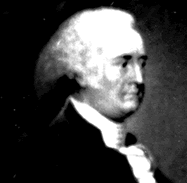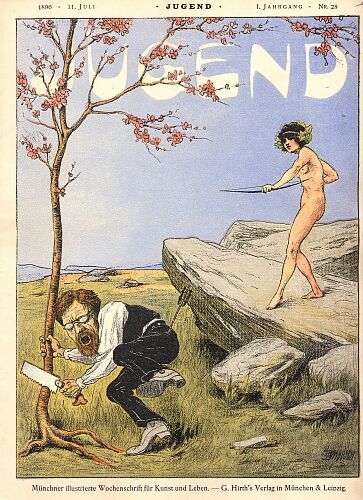November 23

0912 Birth: Otto I (the Great), German king, Holy Roman emperor (962-73).
1221 Birth: Alfonso X (the Wise), king of Castile & Leon (1252-84).
1249 Death: Ajjoeb, sultan of Egypt.
1457 Death: Ladislaus V Posthumus, king of Hungary/Bohemia, at 17.

1553 Birth: Prospero Alpini, in Italy, botanist, physician (De Medocoma Aegyptorum).
1616 Birth: John Wallis, English mathematician, cryptographer (product of Wallis).

1695 Birth: Francois de Cuvillies, Belgian head architect of Bayern. French architect, decorator, and engraver. He will introduce into Germany the rococo style of decoration then popular in France. He will become architect to Charles Albert, elector of Bavaria, and, when the latter becomes Emperor Charles VII (1742), will be appointed architect to the imperial court. His two foremost works, both at Munich, will be the Residenz-Theater (1751–53) and the pavilion called the Amalienburg, in the park of Nymphenburg. The brilliant interiors of the pavilion represent the highest achievements of German rococo decoration. (Bradley)

1749 Birth: Edward Rutledge, Governor-South Carolina; will sign the Declaration of Independence. "Born in Charleston, South Carolina on November 23, 1749, he was the youngest of the seven children of Dr. John Rutledge who came to South Carolina from the north of Ireland about 1735. After acquiring a classical education, young Ned as he was called, read law with his older brother John, ten years his senior who guided him in his career as a lawyer. He was entered as a student at the Temple, a prestigious school in London England in 1769. He attended the courts of law and the houses of parliament for four years, and on being called to the bar, returned to Charleston and entered into practice. Rutledge married the wealthy daughter of Henry Middleton, Henrietta, and subsequently built a home across the street from the house of his brothers John and Hugh. Ned was nearly bald despite his age and "inclining toward corpulency", entered into public life in 1774, when he was elected to the First Continental Congress, with the help of his brother John and his father-in-law, who were both respected politicians. Members of the plantation aristocracy entered prominently into public life at an amazingly early age, and young Rutledge was a member of congress before he was twenty-five. However, he did not make too favorable an impression at this first meeting. He excited the scorn of John Adams, never an admirer of the South Carolinians, who wrote in his diary "Young Ned Rutledge is a perfect Bob-o-Lincoln—a swallow, a sparrow, a peacock; excessively vain, excessively weak, and excessively variable and unsteady; jejeune, inane, and puerile." By June 1776 at the Second Congress, Rutledge, although opposed to independence, gained strength and recognition as one of the more influential members of congress and was selected to sit on the important War and Ordinance Committee. His motions against independence were endless. While he did his best to delay the vote for independence, he is generally held responsible for the postponement of the vote on the resolution of independence, he is also given the major credit for the decision of the South Carolina delegation to go along with the others on July 2 for the sake on unanimity. Edward Rutledge holds the distinction of being the youngest signer of the Declaration. Rutledge left Congress six months later, in the autumn of 1776 and returned to the low country. He distinguished himself as an officer in the militia and as a..."
1760 Birth: Gracchus Babeuf, French utopisch socialist.
1765 The People of Frederick County in Maryland refuse to pay England's Stamp tax.

1804 Birth: Franklin Pierce, in Hillsboro, New Hampshire, 14th US President 1853-1857, nicknamed 'Young Hickory of the Granite Hills'. Franklin Pierce, the 14th President of the United States, came to office during a period of growing tension between the North and South. A politician of limited ability, Pierce was behind one of the most crucial pieces of legislation in American history. Although he did not author the Kansas-Nebraska Act, he did encourage its passage by Congress. And that piece of legislation set the nation on its path to civil war. Like many American politicians, Franklin Pierce's career was aided by his father, a two-term governor of New Hampshire. Before he was thirty, Franklin Pierce had served in the New Hampshire legislature and had been elected to the U.S. Congress where he served as both a congressman and senator. Bored and lonely in Washington, the young congressman developed a drinking problem and a reputation as a gossipy Washington insider. In an attempt to settle down, the handsome, socially gregarious Pierce married Jane Means Appleton. Jane Pierce was her husband's opposite; she was painfully shy, deeply religious, often in bad health, and a strong advocate of the temperance movement. She detested Washington and refused to live there, even after Pierce became a U.S. senator in 1837. Indeed, Jane's disgust with the political life in Washington must have been behind Pierce's decision to resign from the Senate in 1841. Subsequently, Franklin Pierce served in the Mexican-American War, and in something of a surprise was elected President in 1852. After his presidency he retired to Concord, New Hampshire, where he died in 1869."

1821 Birth: Charles Meryon, British-French etcher.

1830 Birth: Kaspar C.E. Ritter von Zumbusch, German-Austrian, artist, sculptor.
1832 The French take Antwerp while liberating Belgium.
1835 A machine for manufacturing horseshoes is patented by Henry Burden of Troy, New York.
1837 Birth: John van der Waals, in Holland, physicist (Nobel 1910, Liquid & Gas States).
1860 Birth: Karl Branting, in Sweden, statesman, diplomat (Nobel Peace Prize 1921).

1862 Birth: Theo Van Rysselberghe, Belgian painter (pointillisme).

1863 US Civil War: The Battle of Chattanooga and Orchard Knob in Tennessee begins.

1883 Birth: Jose Clemente Orozco, in Mexico, painter (Epic of Culture in New World).
1889 The first jukebox is placed in service in the Palais Royal saloon in San Francisco, California. Juke (Juke joint), is a slang word for a disorderly house, or house of ill repute. The unit, developed by Louis Glass, contains an Edison tinfoil phonograph with four listening tubes. Five cents buys you a few minutes of music. The contraption takes in $1,000 in six months. (Bradley)
1896 Birth: Klement Gottwald, postwar premier-president of Czechoslovakia (1946-53).

1909 Birth: Nigel Tranter, author, historian (River Realm, Robert the Bruce).
1918 WW1: General Paul von Lettow-Vorbeck surrenders his command in Africa.

1923 Weimar: German army commander General Von Seeckt bans the NSDAP and KPD.

1923 Weimar: Germany's Stresemann government falls to the SPD.

1926 Weimar: Hitler gives a speech to the party faithful. (Short Excerpt.)
1933 Romanian Premier Ion Duca outlaws the anti-Semitic Cuzist Party and the Garda de Fier (Iron Guard).
1933 The Monarchists are victorious in Spain.
1936 Holocaust: The Nazis blacklist some 2,000 works written by Jewish authors.
1938 Holocaust: All Jewish-owned plants and retail businesses in Germany are dissolved by a special administrative order. Jews are completely eliminated from German economic life. (Persecution; Edelheit)
1939 Holocaust: Mandatory wearing of the Star of David by Jews is introduced by the Germans in Poland. (Persecution)

1939 WW2: Wartime speech by Hitler: "For the first time in 67 years it must be made clear we do not have a two-front war to wage. That which has been desired since 1870, and considered as impossible to achieve, has come to pass. For the first time in our history, we have to fight on only one front, the other front is at present free. But no one can know how long that will remain so. I have doubted for a long time whether I should strike in the East and then in the West. Basically I did not organize the armed forces in order not to strike. The decision to strike was always in me. Earlier or later I wanted to solve the problem. Under pressure it was decided that the East was to be attacked first..."

1940 WW2: Antonescu not Sturdza signs the Tripartite Pact that brings Romania into the Axis Alliance (Berlin-Tokyo-Rome). Hitler, at the same time, begins efforts to bring Bulgaria and Yugoslavia into the Axis orbit.
1941 WW2: In the Moscow sector, Germans forces continue to advance. Some are within 35 miles of Moscow.
1942 Stalingrad: The South-West and Stalingrad Fronts link up. Sixth and part of Fourth Panzer Armies, comprising 22 divisions and some 330,000 men, are trapped. The Roumanian Third Army has been destroyed and the Fourth badly battered. The task is to destroy the trapped German army, but the Soviet forces are too weak to do so immediately. (Messenger)
1942 WW2: Japanese planes bomb Port Darwin, Australia.

1944 WW2: The US 7th Army under General Patch conquers Straatsburg.
1945 Meat and butter rationing ends in the US.
1946 Death: Fawzi Husseini, Arabic High Director for Palestine, murdered.
1946 The French Navy fires on Haiphong, Vietnam, killing 6,000.

1952 Death: Aaro A. Hellaakoski, Finnish geographer, poet, at 59.
1956 Suez: As the crisis deepens, petrol is rationed in Britain and driving tests are suspended.
1958 Ronald and Nancy Reagan appear together in the 'GE Theatre' production of A Turkey for the President.

1960 Tiros 2, a pioneering weather satellite, is launched.
1963 The Horatio Alger Society is founded.

1963 The body of assassinated president John F. Kennedy, lays in repose in the East Room of White House.
1974 Death: Cornelius Ryan, war reporter, historian (A Bridge Too Far), at 54.
1985 Retired CIA analyst Larry Wu-tai Chin, is arrested for spying for China.
2001 Supporters of the euro hail Tony Blair for one of the most pro-European speeches of his career.

2001 Amidst sporadic gunfire, advances continue by Northern Alliance forces surrounding Konduz, the Taliban's last stronghold in northern Afghanistan. Contradictory reports continue on whether several thousand foreign fighters, mainly from Pakistan, will give up. Pentagon officials have told the Alliance that they oppose any deal with foreign fighters because many of the foreign fighters belong to the al-Qaeda network.
2001 Hundreds of American and British special forces continue undercover operations in search of al-Qaeda members. Referring to the US special forces, a Bush administration official is quoted as saying, "They have killed in the hundreds. There have been no deaths on our side. They're not leaving a footprint. When these guys go to sleep, they sleep on the ground. They don't have a fixed base camp."
2001 The Red Cross states that 1,500 tons of food have arrived in Mazar-e-Sharif via Turkmenistan.
2001 Anthrax tests on the mail and home of an elderly woman who died from anthrax all prove negative.
2001

2002

2003

2004

2004

2004

2004

Visit:
 Visit:
Visit:

Click Here to email the History: One Day At a Time webmaster.
































 Visit:
Visit:
